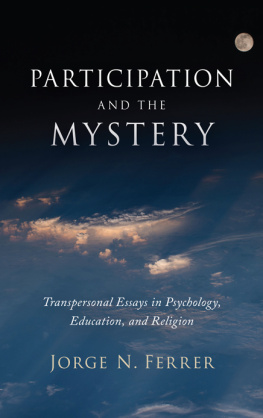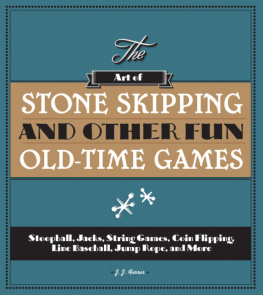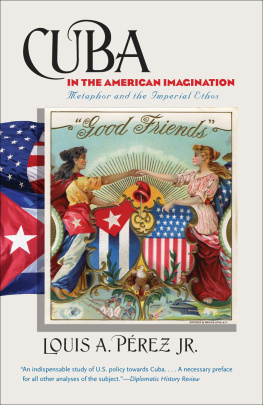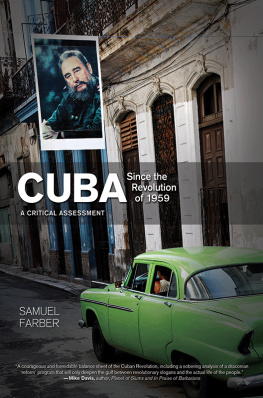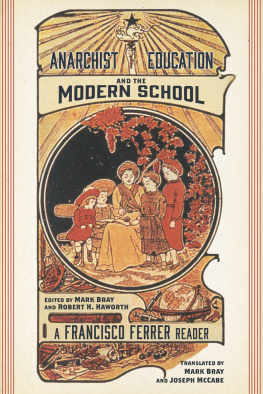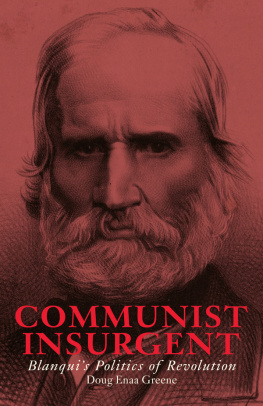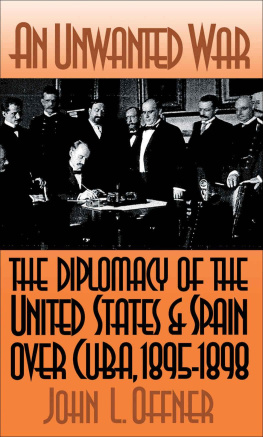Ferrer - Insurgent Cuba: race, nation, and revolution, 1868-1898
Here you can read online Ferrer - Insurgent Cuba: race, nation, and revolution, 1868-1898 full text of the book (entire story) in english for free. Download pdf and epub, get meaning, cover and reviews about this ebook. City: Chapel Hill;Cuba;Kuba, year: 1999, publisher: The University of North Carolina Press, genre: Politics. Description of the work, (preface) as well as reviews are available. Best literature library LitArk.com created for fans of good reading and offers a wide selection of genres:
Romance novel
Science fiction
Adventure
Detective
Science
History
Home and family
Prose
Art
Politics
Computer
Non-fiction
Religion
Business
Children
Humor
Choose a favorite category and find really read worthwhile books. Enjoy immersion in the world of imagination, feel the emotions of the characters or learn something new for yourself, make an fascinating discovery.

Insurgent Cuba: race, nation, and revolution, 1868-1898: summary, description and annotation
We offer to read an annotation, description, summary or preface (depends on what the author of the book "Insurgent Cuba: race, nation, and revolution, 1868-1898" wrote himself). If you haven't found the necessary information about the book — write in the comments, we will try to find it.
Insurgent Cuba: race, nation, and revolution, 1868-1898 — read online for free the complete book (whole text) full work
Below is the text of the book, divided by pages. System saving the place of the last page read, allows you to conveniently read the book "Insurgent Cuba: race, nation, and revolution, 1868-1898" online for free, without having to search again every time where you left off. Put a bookmark, and you can go to the page where you finished reading at any time.
Font size:
Interval:
Bookmark:
Insurgent Cuba
1999 The University of North Carolina Press
All rights reserved
Set in Minion and Franklin Gothic type by Keystone Typesetting, Inc.
Manufactured in the United States of America
The paper in this book meets the guidelines for permanence and durability of the Committee on Production Guidelines for Book Longevity of the Council on Library Resources.
Portions of the introduction, chapters 3, 5, and 7, and the conclusion were adapted from materials that first appeared in the following articles: Cuba, 1898: Rethinking Race, Nation, and Empire, Radical History Review 73 (Winter 1999): 2246. Used by permission of Cambridge University Press.
Social Aspects of Cuban Nationalism: Race, Slavery, and the Guerra Chiquita, 18791880 Cuban Studies 21 (1991): 3756. Original material reprinted by permission of the University of Pittsburgh Press.
Rustic Men, Civilized Nation: Race, Culture, and Contention on the Eve of Cuban Independence, Hispanic American Historical Review 78 (November 1998): 66386; The Silence of Patriots: Racial Discourse and Cuban Nationalism, in Jos Marts Our America: From National to Hemispheric Cultural Studies, edited by Jeffrey Belnap and Ral Fernndez, 22849. Durham, N.C.: Duke University Press, 1998. Original material reprinted by permission of Duke University Press.
Library of Congress Cataloging-in-Publication Data
Ferrer, Ada.
Insurgent Cuba: race, nation, and revolution, 18681898 / Ada Ferrer.
p. cm.
Includes bibliographical references (p. ) and index.
ISBN 0-8078-2500-x (alk. paper).ISBN 0-8078-4783-6 (pbk.: alk. paper)
1. CubaHistoryInsurrection, 18681878. 2. CubaHistory18781895. 3. CubaHistoryRevolution, 18951898. 4. RacismCubaHistory19th century. 5. BlacksCubaPolitics and governmentHistory19th century. 6. CubaRace relationsPolitical aspects. I. Title.
F1785.F36 1999
972.9105dc21 99-13684
CIP
cloth 06 05 04 03 02 5 4 3 2 1
paper 06 05 04 03 02 7 6 5 4 3
To my parents,
Ramn and Adelaida Ferrer
In memory of
Rita Blanco Garca, 18881975
ILLUSTRATIONS
Carlos Manuel de Cspedes,
Guillermo Moncada,
Jos Mart,
Juan Gualberto Gmez,
Rafael Serra,
Manuel Sanguily,
Cuban Regiment, 1898,
Ricardo Batrell Oviedo,
Insurgent camp of Jos Gonzlez Planas,
General Quintn Bandera,
Insurgent camp of Pedro Betancourt,
Mustering out the Liberation Army,
MAPS
1.1. Map of Cuba,
4.1. Plan for the Construction of the Poblado of La Yaba,
TABLES
1.1. Population of Selected Jurisdictions of Eastern Cuba in 1862,
2.1. Population of Selected Jurisdictions of Eastern and Central Cuba in 1862,
I would not have wanted to attempt this project without the benefit of working with Cuban colleagues and in Cuban archives, or without the pleasures and challenges of being in Cuba. I am very grateful to many historians on the island who talked to me about my project and who were willing to share ideas, references, and encouragement. I am especially indebted to Jorge Ibarra, whose work on Cuban nationalism helped shape my interest in this topic and whose support and engagement were invaluable in writing this book. I thank also Jos Abreu Cardet, Gisela Arandia, Carmen Barcia, Manuel Barcia, Walterio Carbonell, Yolanda Daz, Toms Fernndez Robaina, Reinaldo Funes, Orlando Garca Martnez, Oilda Hevia, Fe Iglesias, Marial Iglesias, Blancamar Len, Enrique Lpez, Fernando Martnez, Mayra Mena, Olga Montalbn, Francisco Prez Guzmn, and Oscar Zanetti for sharing their work, for offering suggestions and references, and for talking about the topics treated here and about many others as well. Thanks go also to Yolaida Durn, who shared with me the experience of being Cuban American in Cuba, and to Ada Fernndez, who offered me her home, her conversation, and her warmth. In Spain, I thank Josep Fradera, Consuelo Naranjo Orovio, Luis Miguel Garca Mora, and Jordi Maluquer for giving me the opportunity to present very early versions of some of this work in Madrid and Barcelona.
At the University of Michigan I benefited from the company of some truly remarkable people. For their support and intellectual engagement I am especially grateful to Neil Foley, Charo Montoya, Karen Robert, Christopher Schmidt-Nowara, Michael Schroeder, Sabina MacCormack, Roger Rouse, Earl Lewis, and Ruth Behar. Fred Cooper, Fernando Coronil, Geoff Eley, and Santiago Cols deserve special thanks for their comments on an earlier version of the manuscript. Rebecca Scott has read more drafts of the chapters in this book than I can today reconstruct. She has been generous with her time and her insights; and I have learned enormously from her work and from her questions and comments on mine. I thank her for all the guidance, but also for her friendship and example.
Many other people, too numerous to mention here, read either all or parts of the manuscript and offered suggestions that were extremely helpful in drafting and revising the manuscript. Besides some of the people already mentioned, I am especially grateful to Louis Prez, Robin Kelley, and Walter Johnson for their helpful and generous comments on an early draft and for many conversations since. I am equally grateful to my Latin Americanist colleagues at New York University, Bill Roseberry and Sinclair Thomson, who read a later draft of the book and provided thoughtful suggestions and support. For their comments on all or parts of the manuscript at various stages, I also thank Jeremy Adelman, Reid Andrews, Tom Bender, Sueann Caulfield, the late Warren Dean, Ruthanne Deutsch, Hasia Diner, Alejandro de la Fuente, Martha Hodes, Winston James, Kathy Kerr, Sidney Mintz, Robert Paquette, Marifeli Prez-Stable, Jeffrey Sammons, Jerry Seigel, Danny Walkowitz, Carla Yanni, Marilyn Young, Michael Zeuske, and finally Laird Bergad and the second, anonymous reader for the University of North Carolina Press.
Several institutions provided financial support and documentary evidence, without which the book could have never existed. I thank the staffs at the Interlibrary Loan Office at New York University and the archives and libraries listed in the bibliography for helping me identify and locate relevant material for my work. Funding for research in Cuba and Spain was provided by the Fulbright Commission, the Social Science Research Council, the Johns HopkinsSAIS Cuban Studies Center, the American Philosophical Society, and the Conference on Latin American Historys Lewis Hanke Prize. An NEH grant at the Schomburg Center for Research in Black Culture gave me the time, materials, and support necessary to complete most of the project. Howard Dodson, director of the center; Diana Lachatanere, archivist and director of the Scholars Program; and Miriam Jimnez Roldn asked me questions that pushed me further and forced me to rethink historical comparisons. So, too, did conversations with the other fellows in the program and with the directors of the scholars seminar, Colin Palmer and Bob OMeally. I owe a debt of gratitude to Francisco Fuentes Milln, Melina Pappademos, and Arnaldo Jos Lpez Maldonado, who provided timely and useful research assistance in the final stages of preparing the manuscript. I would also like to thank Grace Buonocore, Pam Upton, and, especially, Elaine Maisner at the University of North Carolina Press for their work on and interest in this project.
My husband, Gregg Van Ryzin, did many things to aid me in completing this project: from helping me transcribe army rosters in Cuba to aligning columns on tables to reading multiple drafts of multiple chapters. For that I thank him, of course. But I thank him also for keeping me sane, for becoming my home. My daughter, Alina, helped as she knew how by asking when I would finish, by teaching me what I now call sand therapy, and by making me happy.
Next pageFont size:
Interval:
Bookmark:
Similar books «Insurgent Cuba: race, nation, and revolution, 1868-1898»
Look at similar books to Insurgent Cuba: race, nation, and revolution, 1868-1898. We have selected literature similar in name and meaning in the hope of providing readers with more options to find new, interesting, not yet read works.
Discussion, reviews of the book Insurgent Cuba: race, nation, and revolution, 1868-1898 and just readers' own opinions. Leave your comments, write what you think about the work, its meaning or the main characters. Specify what exactly you liked and what you didn't like, and why you think so.


